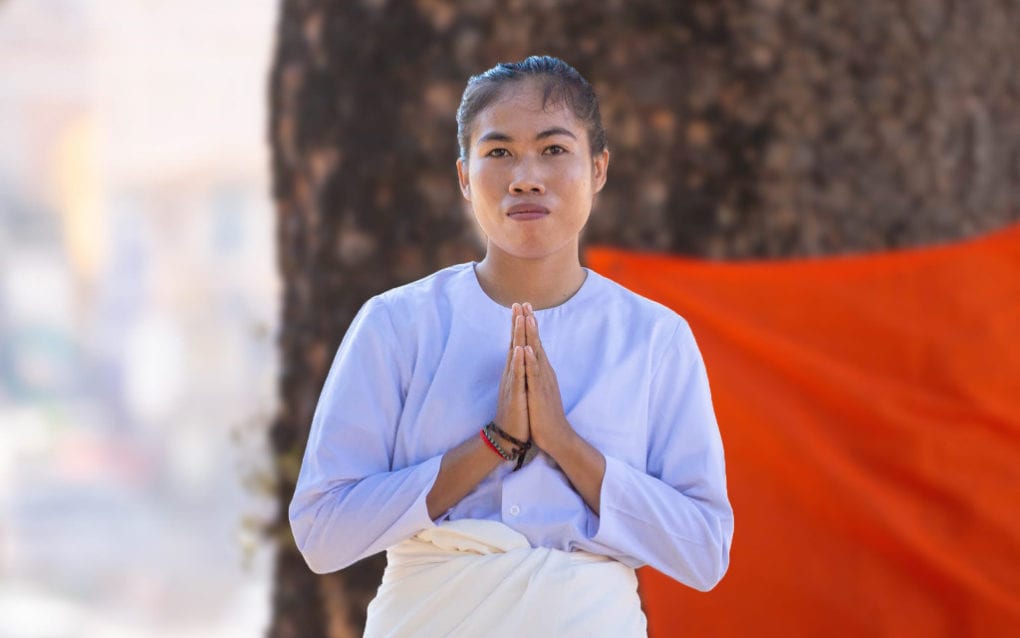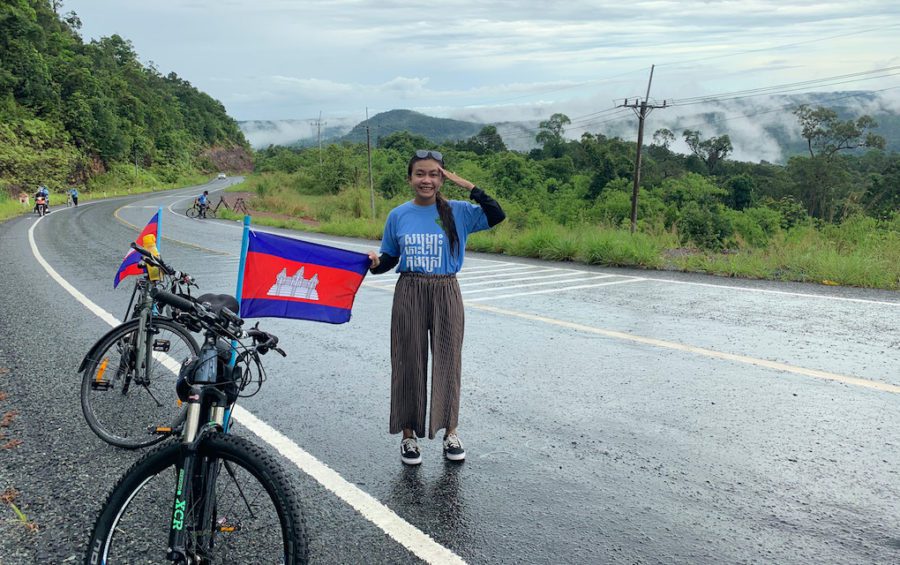Three youth activists for environmental group Mother Nature stood firm in the closing of their incitement trial on Thursday as the presiding judge pressed them that the group’s Facebook page was illegal, the government filling in lakes would improve traffic, and the activists’ research was insufficient.
The Phnom Penh Municipal Court on Thursday held the second and final hearing in the trial against three Mother Nature activists — Phuon Keoreaksmey, Thun Ratha and Long Kunthea — with the court playing five short video clips of their advocacy activities. They are charged with incitement to disturb social security and face up to two years in prison if found guilty.
The activists were arrested last year as they planned a one-person march to be led by Kunthea about the filling in of Phnom Penh’s Boeng Tamok lake. The case also involves Mother Nature founder Alejandro Gonzalez-Davidson, who was deported from the country in 2015, and another activist, Chea Kunthin, whose whereabouts are unknown.
The court played two videos showing youth activists, including Phuon Keoraskmey, cycling from Koh Kong to Phnom Penh last year to raise awareness about Koh Kong Krao and push Prime Minister Hun Sen to declare the undeveloped island off Koh Kong’s coast a protected area.
Authorities stopped the activists in Koh Kong province and prevented them from continuing their bike ride by confiscating the bicycles.
Keoreaksmey said in the video that the activists did not believe Koh Kong officials who said they would protect the island, and wanted to get assurance from the prime minister that the island’s natural resources would remain untouched. She pointed to the destruction of other protected areas, like the Prey Lang Wildlife Sanctuary and Prey Preah Roka, to justify their apprehension.
However, Judge Li Sokha on Thursday questioned the legality of the group’s Facebook page and their intention behind the bicycle campaign.
“Do you know that posting on the Mother Nature [Facebook] page is illegal?” the judge queried.
Keoreaksmey responded: “We still think that it is not illegal and this page still worked as usual.”
Sokha also questioned what evidence she had collected, pointing out that “you did not go there.”
Keoreaksmey said neither had Koh Kong authorities gone to Koh Kong Krao when they claimed that there was no impact on the island’s natural resources.
“They did not show [evidence] either. They just verbally stated this,” she said.
The court next played a video of Thun Ratha questioning the infilling of the Boeng Prek Top lake in Preah Sihanouk province, which had been given to family members of influential tycoon Ly Yong Phat.
“How much money [did] the government get from Ly Yong Phat’s company, and in the future if Preah Sihanouk city is short of water, does Samdech dare to take responsibility or not?” Ratha is seen saying in the video.
Judge Sokha explained to Ratha that Sihanukville did not get its water from Boeng Prek Top alone and that it also got water from Kbal Chhay, which is controlled by another tycoon, Kok An.
“If you are not clear, you have to clarify with water authority,” Sokha said.
Ratha said he would confirm the judge’s claim when he was released from prison, but Sokha quickly deflected and again questioned the legality of Mother Nature’s Facebook page.
Another video featured Long Kunthea, dressed in all white, asking Hun Sen to protect Boeng Tamok lake in Phnom Penh, which has recently been allocated piecemeal to government agencies and private firms and individuals, including Yong Phat’s wife.

Judge Sokha claimed that roads built on the filled-in lake would help ease traffic in Phnom Penh. Kunthea questioned the judge’s assertion, saying the benefits would mostly go only to a small handful of people.
During the presentation of the videos, the judge challenged the merits of the activists’ advocacy campaigns, but there was little discussion about how their activities may have incited other people, as the activists are charged with doing.
Earlier in the hearing, Sokha prevented defense lawyers from questioning a Phnom Penh deputy police chief over procedures used to extract data from the activists’ confiscated phones.
Making his closing comments, deputy prosecutor Kuch Kimlong, who was standing in for deputy prosecutor Soeu Longdy, who is in quarantine, said the three activists were looking to incite and cause social insecurity in cooperation with foreigners and by giving radio interviews.
He said, “The accused said they did not ask permission [for their activities] from authorities. But they still did it, with the aim to incite and cause chaos.”
Defense lawyer Ly Sochetra said the judge should drop the charges against his clients, who were only advocating for the protection of the environment. He said Kunthea’s plan to meet and petition Hun Sen was similar to a child approaching its parents with a request.
“If we look at the facts, there is no damage that happened by the activities of my clients,” Sochetra said.
Sam Chamroeun, another defense lawyer, said the activities listed by the court happened a long time ago and that there was no damage or chaos caused from these activities.
“Is there any significant public anger like in Myanmar? There is none,” he said.
In their final statements before the court, Ratha asked the judge to make his judgment based on his own discretion and not under the influence of anyone else, and Keoreaksmey said Cambodians have to encourage each other and only correct those who are wrong.
The court is scheduled to deliver a verdict on May 5. The three activists will remain in detention until then.













